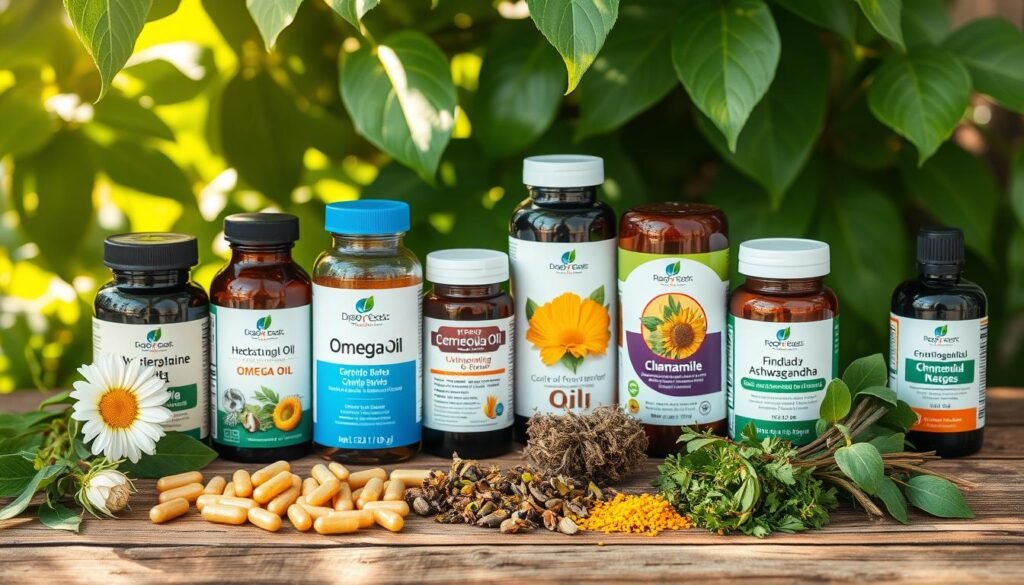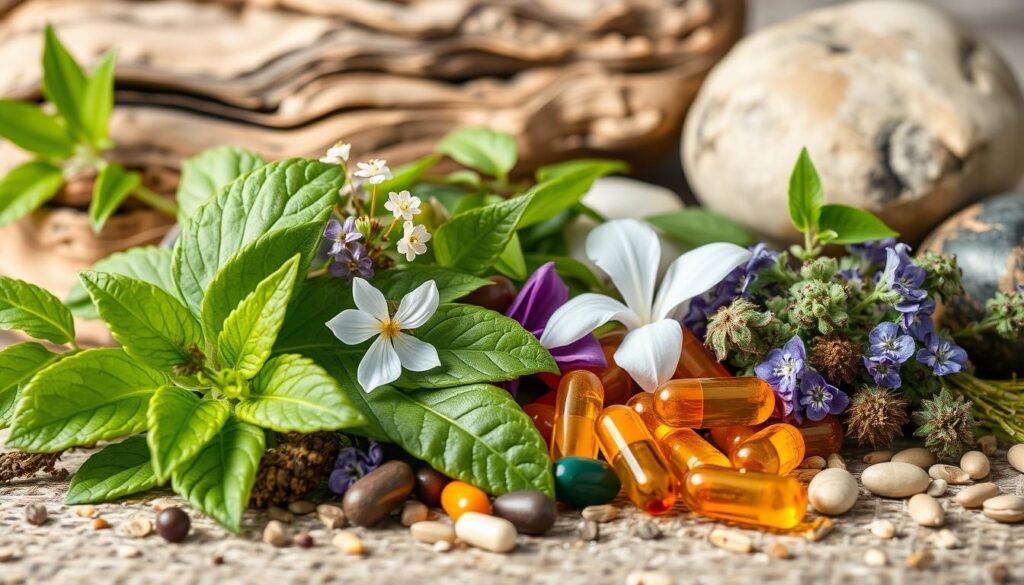Nearly one in five adults in the U.S. faces mental illness. Depression and anxiety are very common among these issues. This fact shows the critical need for effective treatments. Many people are now using supplements for depression and anxiety to feel better and improve their mental health.
While traditional therapy is important, natural remedies are also showing promise. Studies suggest these supplements could help with mood disorders. People are looking for treatments that are holistic and easy to get. But, it’s very important to talk to doctors before trying these supplements. They can make sure it’s safe and works well for you.
Key Takeaways
- Approximately one in five adults in the U.S. experiences mental illness, including depression and anxiety.
- Supplements for depression and anxiety can be effective alongside traditional treatments.
- Natural remedies for mental health, such as herbal and vitamin supplements, are gaining popularity.
- Consulting with healthcare professionals is crucial before starting any supplement regimen.
- Maintaining a well-rounded diet and lifestyle can enhance the effects of health supplements.
Understanding Depression and Anxiety
Depression and anxiety are big issues in mental health. They often come together, making things hard for those affected. This affects how they live, get along with others, and feel overall. Knowing the signs of depression and anxiety is critical. It helps identify when someone needs extra help.
Common Symptoms of Depression and Anxiety
People with depression might feel really sad, hopeless, or tired. They could eat more or less than usual. They might have trouble sleeping or focusing. Sometimes, they think about suicide.
- Persistent sad mood
- Feelings of hopelessness
- Fatigue or low energy
- Changes in appetite or weight
- Difficulties with sleep
- Concentration issues
- Thoughts of suicide
For anxiety, signs include worrying a lot, feeling restless, and having a fast heartbeat. Interestingly, only 46% of people get better with common treatments. This shows how important it is to find good ways to manage these problems. This can involve talking to a therapist or trying supplements for depression and anxiety.
Impact of Mental Health on Daily Life
Mental health issues can greatly affect day-to-day life. They can make it tough to connect with people. This can lead to problems at work and missed chances to move up. These issues don’t just affect the person, but also their family and friends. Everyone needs to understand and support each other.
It’s important to note that some groups, like women and LGBTQI+ people, might face these challenges more. So, helping those with mental health issues is vital for everyone’s happiness and health.
The Role of Supplements in Mental Health
Supplements can greatly help in managing depression and anxiety. They can be used along with psychotherapy and medications. This can give extra support to those facing mood disorders.
How Supplements Interact with Traditional Treatments
Using supplements with traditional treatments is getting more popular. For example, omega-3 fatty acids have been successful in treating depression. Many studies back this up. Folate-based supplements, like high-dose methylfolate, are also beneficial for depression. N-acetylcysteine shows promise for mood disorders and schizophrenia too.
Types of Supplements Available
The market offers a wide range of supplements for mental health:
- Vitamins: Vitamin D and B vitamins are key for brain health. Adequate vitamin D can help reduce depression symptoms.
- Minerals: Zinc and iron are important. Low levels are often found in people with mood disorders. Supplementing can help.
- Herbal Supplements: St. John’s Wort is popular for depression. But, it can interact with medications. Be careful.
- Probiotics: New research shows pre- and probiotics may help mood by improving gut health.
Natural Remedies for Mental Health
Studying natural remedies for mental health has become more popular, especially looking at herbs for anxiety. People wanting to improve their mental health often use herbs like St. John’s Wort and lavender. These herbs offer benefits and are options for those wanting to add to their usual treatments.
Herbal Supplements and Their Benefits
Herbal supplements can help with anxiety and depression. St. John’s Wort, for instance, can boost serotonin levels, aiding in mild to moderate depression. Saffron has also been found effective against depression, sometimes as much as standard antidepressants. Lavender and chamomile are known for their calming effects, which can help reduce anxiety.
The Importance of Choosing Quality Products
Finding good quality natural remedies is key. The supplement market lacks the strict rules that drugs have. It’s important to pick supplements carefully, checking ingredients and certifications for safety. Always talk to a healthcare provider before trying any herbal supplements. This helps avoid problems with other medications and ensures you’re using a quality product.
Supplements for Depression and Anxiety
Many people are looking at supplements for depression and anxiety as extra help. Some show promise, but others can be risky. It’s key to know both the good and bad before choosing.
St. John’s Wort: Benefits and Risks
St. John’s Wort is a popular choice for easing depression. It helps many with mild or moderate symptoms. This herb might boost brain serotonin levels. But, it can clash with some drugs like antidepressants and birth control. Always check with a doctor before starting it.
5-HTP: How It Affects Serotonin Levels
5-HTP is another supplement aimed at increasing serotonin. This could help improve mood and lessen anxiety for some. Since reactions can vary, it’s wise to talk to a healthcare provider before trying it.
Saffron: An Emerging Natural Treatment
A 2019 review found saffron helpful for light to moderate depression, better than placebo. Thanks to its natural anti-inflammatory qualities, it’s gaining attention as a safe add-on treatment.
Omega-3 Fatty Acids: Heart and Mind Benefits
Omega-3 fatty acids are celebrated for their overall health perks, including mental health. They might help lessen depression for some. Those taking supplements with more EPA than DHA often feel better. Considering mental health’s complexity, these supplements for depression and anxiety are worth looking into as part of a larger plan.

| Supplement | Primary Benefit | Considerations |
|---|---|---|
| St. John’s Wort | Potential anti-depressive effects | Can interact with medications |
| 5-HTP | Boosts serotonin levels | May cause gastrointestinal issues |
| Saffron | Mild to moderate depression relief | Higher cost than typical herbs |
| Omega-3 Fatty Acids | Improved mental health | Mixed efficacy; diet should be noted |
With millions in America dealing with depression and anxiety, exploring these supplements can be helpful. To find out more about over-the-counter choices, check this detailed guide.
Best Vitamins for Mood Support
Vitamins are key for mood and mental well-being. Vitamins B9, B6, and B12 play crucial roles. They are vital for brain health and making neurotransmitters. Having enough of these vitamins can reduce anxiety and depression. This issue affects roughly 14% of people worldwide.
Vitamin B9 (Folate): Role in Neurotransmitter Creation
Vitamin B9, or folate, is needed for making neurotransmitters like serotonin. These are important for managing mood. People with low folate levels often face mood disorders. Getting enough folate helps with emotional stability and may prevent depression. Sometimes, food alone isn’t enough, and supplements become necessary. Research links folate to depression prevention, emphasizing nutrition in mental health care.
Vitamin B6 and B12: Importance in Mental Health
Vitamin B6 is vital for serotonin, melatonin, and dopamine production. Without enough B6, people may feel more anxious or depressed. One study showed that Vitamin B6 greatly lowered stress and anxiety. This underlines its role in mental health.
On the other hand, lacking Vitamin B12 can cause fatigue and mood changes. B12 is crucial for brain health. It’s especially important for older adults to get enough. Including these vitamins can benefit those with mood disorders. For deeper insight, the Mayo Clinic provides more information.
Herbal Supplements for Anxiety Relief
Many people look for natural ways to deal with anxiety. They prefer herbal supplements to avoid the side effects of medicines. Rhodiola and Chamomile are two herbs that show promise. They help support emotional well-being.
Rhodiola: Stress Adaptation and Support
Rhodiola helps the body cope better with stress. It’s known to ease anxiety symptoms. The herb can lift your mood and lessen tiredness.
About 45% of people in studies felt better after using Rhodiola. It seems especially useful for those with ongoing stress and anxiety. This makes Rhodiola a top choice for herbal anxiety relief.
Chamomile: A Gentle Anxiety Remedy
German Chamomile is famed for its ability to calm nerves. Studies show it can greatly reduce anxiety. It may also help improve your mood.
For those dealing with anxiety and depression, Chamomile offers a simple remedy. Its calming effects are known to promote peace of mind. Regularly consuming Chamomile can lead to better well-being.

| Herb | Potential Benefits | Usage Recommendations |
|---|---|---|
| Rhodiola | Reduces stress and fatigue, improves mood | 500-600 mg daily |
| Chamomile | Calms anxiety, improves mood | 2-3 cups of tea daily or in supplement form |
Looking into herbal supplements for anxiety relief? Rhodiola and Chamomile are great options. They can help manage anxiety symptoms effectively.
Dietary Supplements for Emotional Well-Being
Many people look for ways to feel better emotionally. They often turn to dietary supplements. SAMe and DHEA are two options that might help improve mood and emotional health.
SAMe: A Natural Mood Enhancer
SAMe, or S-adenosylmethionine, is a compound our bodies make. It helps create neurotransmitters that control our mood. Research shows SAMe could lessen depression symptoms, making it a go-to choice for better emotional well-being. People take it in specific amounts, following a professional’s advice to make sure it’s safe and works well.
DHEA: The Hormonal Approach to Depression
DHEA stands for dehydroepiandrosterone. It’s a hormone our adrenal glands make. It leads to the production of estrogen and testosterone. Some research suggests it might help with mood stability and fighting depression. For those aiming for a more balanced emotional state, this hormone could help. Remember, it’s important to use the right dose and choose quality products. The oversight of dietary supplements varies a lot between brands.
Holistic Approaches to Mental Health
To address mental health well, we need a full plan that looks at the whole person. Holistic methods stress the role of different treatments. This includes using both supplements and changing how we live to get better at handling depression and anxiety.
Combining Supplements with Lifestyle Changes
Every year, about 15 million U.S. adults battle depression. Many improve by changing their diet and how they live. For instance, 20% to 25% feel better after cutting out caffeine and added sugars.
Adding exercise to daily life is another key change. Research in Psychosomatic Medicine shows exercise can be as effective as medication for some. It helps many people, including older adults and new moms, feel less depressed and avoid getting sick again.
Mixing dietary supplements with changes like better eating and more exercise makes for a strong mental health approach. The American Holistic Nurses Association points out the need to fix basic issues, such as not having enough nutrients and trauma effects, when looking after mental health.
These approaches might include practices like meditation, talking it out with a therapist, and artistic activities. Such broad strategies allow for better control over mental health. By merging lifestyle changes with supplements, people can create a healing space. This leads to better emotional steadiness and overall health.
| Lifestyle Change | Potential Benefits |
|---|---|
| Eliminate caffeine and added sugars | 20%-25% symptom relief in patients |
| Regular exercise | Reduces depression symptoms; long-term effectiveness |
| Talk therapy | Develops coping skills; long-term management |
| Nutritional changes | Addresses nutrient deficiencies; supports mental health |
| Mindfulness practices | Reduces anxiety and stress levels |
Using holistic approaches helps us understand our needs better. It lets us see how our body, mind, and spirit work together. This way, we can guide our mental health journey towards lasting improvements and a better life.
Nutritional Supplements for Stress Management
Nutritional supplements are key in managing stress, along with a good diet and mental health habits. A diet full of important vitamins helps improve our mood. Vitamins like B6 and B12 play a big role in feeling happy. Studies found that nurses low in these vitamins felt more stressed.
Getting enough of these vitamins is crucial for feeling good.
Managing Diet for Better Mental Health Results
Eating well helps us stay mentally strong. Foods rich in magnesium, omega-3 acids, and vitamin D lower stress. For example, not having enough magnesium can make us more anxious. Omega-3s can reduce signs of depression.
Eating these nutrients regularly makes our minds healthier. This helps our bodies handle stress better.
Lack of vitamin D can also make us feel more stressed. Fixing this with supplements can make us feel steadier when stressed. It’s important to get 600-800 IUs of vitamin D daily. This is especially true when we don’t get much sunlight.
Checking out nutrient-packed foods and supplements can give the best benefits.
Importance of Regular Exercise and Sleep
Staying active is great for both our bodies and minds. Regular workouts lower stress and boost happiness. Good sleep is also a must. Not sleeping well often leads to more stress and worry. Taking melatonin can help us sleep better.
In short, diet, exercise, and supplements all play a part in managing stress. Focusing on these areas can make us feel emotionally stronger.
Consulting Healthcare Professionals
Many people use supplements to help with depression and anxiety. However, it’s important to talk with healthcare experts before starting them. This conversation ensures that supplements won’t harm you, especially if you’re taking other medications.
Why It’s Essential to Talk to a Doctor Before Starting Supplements
Talking to healthcare pros is crucial to find what’s best for your health. Supplements can react with your medications in harmful ways. A doctor can guide you on what’s safe, helping you choose supplements that won’t interfere with your treatment.
Potential Interactions with Existing Medications
Supplements like ashwagandha and turmeric can have strong effects. They may help your mood and stress, but can also cause problems with certain drugs. For instance, turmeric can be risky for people on blood thinners. Always check with your doctor to avoid harmful interactions.
| Supplement | Benefits | Potential Risks |
|---|---|---|
| Ashwagandha | Stress reduction, anti-anxiety effects | Potential herb-drug interactions, limited long-term data |
| Turmeric | Anti-inflammatory properties | Risk for patients on anticoagulants |
| Biotin | May help those with deficiency | Can interfere with thyroid hormone assays |
| Berberine | Improves metabolic health | Many potential drug-drug interactions |
| Valerian Root | May aid sleep disorders | Possible side effects like drowsiness, stomach upset |

Conclusion
Using the right supplements for depression and anxiety helps a lot in taking care of mental health. Vitamin D shows promise in reducing depression and anxiety symptoms. This highlights how crucial nutrition is.
Adding all-around mental health practices into daily life is key. Since everyone’s health is different, what helps one person might not help another.
It’s also important to keep seeking better mental wellness. Talking regularly with health professionals helps people make smart choices about supplements. This is important because many people worldwide struggle with these issues.
Better mental health comes from combining supplements, good nutrition, changes in lifestyle, and expert advice. By focusing on overall mental health, people can build strength and improve their lives. They move toward a happier future.